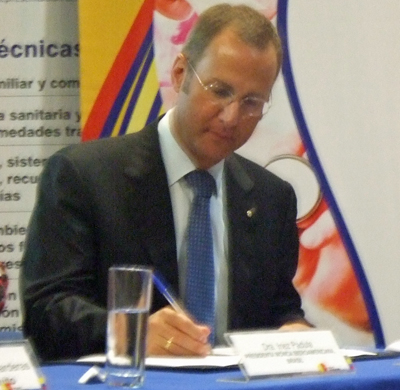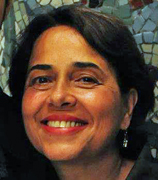The Iberoamerican Summit of Family Medicine and Quito Declaration
español
português
On April 12, at Quito, Ecuador, the V Iberoamerican Summit of Family Medicine concluded after two days of intensive and productive work, including exchange of experiences and participatory activities. Approximately 150 strategic health professionals from more than 24 countries of the world, especially from the Iberoamerican region, participated.
The balance was quite positive. It was an important space in which to reflect and to propose feasible solutions for the structural problems of the Iberoamerican Health Systems. We had the opportunity to have the support and active participation of Carina Vance, the Public Health Minister of Ecuador, as well as other health workers of the Ministry; the major and other representatives of the Health Secretariat of Quito; and Vice-Ministers and/or managers of the health ministries from various countries of Iberoamerica.
The Panamerican Health Organization (PAHO) was, along with CIMF/WONCA and the Ecuador Government, co-promoter of the Summit. The delegation of PAHO, in Quito, included representatives from Washington DC and, also, from the bureau of PAHO in South America and Ecuador. Last, but not least, we had the pleasure to count on the presence of the leaders of WONCA: Michael Kidd, the current president, the CEO, Garth Manning and Amanda Howe, the president elect.
From CIMF, we had the participation of a delegation from 16 of the 20 countries that constitute the Confederation. Besides that, other heath professionals and professors from universities in Ecuador, USA and Canada, as well as members of organized societies had enjoined us. The Summit has been covered in different media: radio (on and off line);
Face Book; the
Summit page . We estimate that almost 1,000,000 people had access to some information about the Summit, during the event.

The recommendations provided by the V Summit are summarized in the
Quito Declaration (
Carta de Quito in the original Spanish). The
Quito Declaration approaches the theme that currently occupies the agenda of the World Health Organization (WHO) and its 193 countries, namely, Universal Health Coverage. As expected, Primary Care and Family Medicine are two aspects of this objective. One consequence of the
Quito Declaration is that it brings concrete statements to deal with this challenge and presents new indicators to measure the actions that have to be enacted for this purpose.
Photo: Michael Kidd, WONCA President, adds his signature to the "Carta de Quito" - Quito Decalration.
The
Quito Declaration was the result of work that took place before and during the event. For the last six months, five working groups have done studies, read texts, written and discussed comprehensive documents on the five central themes of the Summit: Universal Coverage and Family Medicine (FM); Social Participation and Social Communication and FM; Education and Certification on FM; Knowledge and Investigation on FM. During the event, these groups had the opportunity to discuss on a deeper level some relevant issues.
Some aspects of the
Quito Declaration can be considered especially interesting: bringing definitions on Universal Coverage and Family Medicine, and then bringing forward actions and adequate indicators to follow up and to evaluate the quality and the extent of the Universal Health Coverage (UHC) in Iberoamerica.
I would like to highlight that the document points out that a special quality indicator of UHC, is the percentage of family doctors a country has to have (50% of all doctors being considered a good level). Besides that, the
Quito Declaration brings the good idea to create an Observatory on Family Medicine that could foment, guide and follow up the evolution of the initiatives that will be undertaken.
I think that the Summit and the
Quito Declaration reinforce the role of WONCA-Iberoamericana – CIMF as a scientific entity, interested in the quality of life and the wellbeing of the population. It is an example of the collaborative and technico-political role that WONCA/CIMF wants and can develop along with health and education professionals, managers, as well as representatives of organized society. That role could promote changes and constitute health systems more fairly and equally.
Nowadays, unfortunately, we see a big influence of commercial interests on the way of people think about health and disease, promoting a wrong idea that stimulates the consuming of health services, medicines and tests. This way of thinking can bring good results to big companies and industries, but brings bad results to people, increasing the risk of morbidity and mortality, just for the abusive and inadequate use of unnecessary industrialized technologies. Without a good Primary Care system with good Family Doctors, health systems will become progressively further from the real health necessities of people, and have the concrete risk of financial failure.

So, the V Iberoamerican Summit of Family Medicine can be seen as an important contribution to the necessary changes that heath systems need to make in order to reach Universal Health Coverage.
Dr Inez Padula
WONCA Iberoamericana President
Quito Declaration (English)Carta de Quito (español) Declaração de Quito (Português)